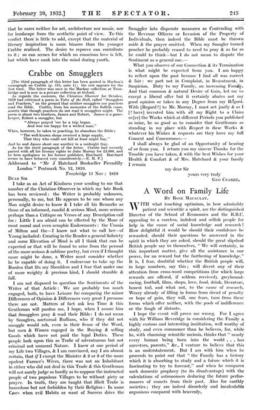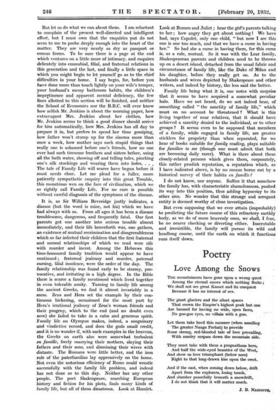A Word on Family Life
BY ROSE MACAULAY.
1VVITH what touching optimism, in how admirably patient and scientific a spirit, are the distinguished Director of the School of Economics and the B.B.C. appealing to a careless, indolent and selfish people for help in the cause of social knowledge and research ! How delightful it would be should their confidence be rewarded, should their questions be answered in the spirit in which they are asked, should the great slipshod British people say to themselves, " We will certainly, in this important matter, give all the assistance in our power, for no reward but the furthering of knowledge." It is, I fear, doubtful whether the British people will, in large numbers, say this ; will divert any of their attention from cross-word competitions (for which large rewards are offered, if seldom received), greyhound- racing, football, films, shops, love, food, drink, literature, honest toil, and what not, to the cause of research. Weary already of filling in forms from dread of penalty or hope of gain, they will, one fears, turn from these forms which offer neither, with the pooh of indifference or the faugh of distaste.
I hope the event will prove me wrong. For I agree with Sir William Beveridge in considering the Family a highly curious and interesting institution, well worthy of study, and even commoner than he believes, for, while he, with charming scientific meiosis, thinks that " nearly every human being born into the world . . . has ancestors, parents," &c., I venture to believe that this is an understatement. But I am with him when lie proceeds to point out that " the Family has a history which it is absorbing to study and a future which it is fascinating to try to forecast," and when he compares such domestic prophecy (to its disadvantage) with the calculations of astronomers deducing the future perfor- mances of comets from their past. Alas for earthly societies ; they are indeed disorderly and incalculable organisms compared with heavenly,
But let us do what we can about them. I am reluctant to complain of the present well-directed and intelligent effort, but I must own that the enquiries put do not seem to me to probe deeply enough into the heart of the matter. They are very nearly as dry as passport or census forms. To be sure there is a page at the end which ventures on a little more of intimacy, and enquires delicately into connubial, filial, and fraternal relations in this generation and the last, and finally a little space in which you might begin to let yourself go as to the chief difficulties in your home. I say begin, for, before you have done more than touch lightly on your wife's temper, your husband's messy bathroom habits, the children's impertinence and apparent mental deficiency, the few lines allotted to this section will be finished, and neither the School of Economics nor the B.B.C. will ever know how selfish Mr. Jenkins is about the morning paper, how extravagant Mrs. Jenkins about her clothes, how Mr. Jenkins seems to think a good dinner should arrive for him automatically, how Mrs. Jenkins has all day to prepare it in, but prefers to spend her time gossiping, how father won't stump up for the cinema more than once a week, how mother says such stupid things that really one is ashamed before one's friends, how no one ever had such tiresome brothers and sisters before, using all the bath water, showing off and telling tales, pinching one's silk stockings and wearing them into holes. . The tale of Family Life will scarce have begun before it must needs close. Let me plead for a fuller, more patiently sympathetic enquiry into this great Trouble, this monstrous wen on the face of civilization, which we so rightly call Family Life. For no cure is possible without careful diagnosis of the symptoms of the disease.
It is, as Sir William Beveridge justly indicates, a disease (but the word is mine, not his) which we have had always with us. From all ages it has been a disease troublesome, dangerous, and frequently fatal. Our first parents got one another into serious trouble almost immediately, and their life henceforth was, one gathers, an existence of mutual recrimination and disagreeableness which so far infected their children that the fust fraternal and sororal relationships of which we read were rife with murder and incest. Among the Hebrews this time-honoured family tradition would appear to have continued ; fraternal jealousy and murder, paternal cursing, filial insolence, were the order of the day. The family relationship was found early to be stormy, pro- vocative, and irritating in a high degree. In the Bible there is scarce a family mentioned which lived together in even tolerable amity. Turning to family life among the ancient Greeks, we find it almost invariably in a mess. Zeus and Hera set the example by their con- tinuous bickering, occasioned for the most part by Hem's irrational jealousy of Zeus's woman friends and their progeny, which to the end (and no doubt even now) she failed to take in a calm and generous spirit. Family life on Olympus makes, indeed, a sanguinary and vindictive record, and does the gods small credit, and it is no wonder if, with such examples in the heavens, the Greeks on earth also were somewhat turbulent en famine, freely marrying their mothers, slaying their fathers and their sons, and dismissing their wives with distaste. The Romans were little better, and the iron rule of the paterfamilias lay oppressively on the home. Not even the notorious efficiency of Rome could wrestle successfully with the family life problem, and indeed has not done so to this day. Neither has any other people. The poet Shakespeare, searching European history and fiction for his plots, finds many kinds of family life, but all of them disastrous. Look at Hamlet. Look at Romeo and Juliet ; hear the girl's parents talking to her ; how angry they get about nothing ! We have had, says Capulet, only one child, " but now I see this one is one too much, and that we have a curse in having her." So had she a curse in having them, for this curse is, as a rule, mutual. So it was with the Lear family. Shakespearean parents and children need to be thrown up on a desert island, detached from the usual fabric and circumstance of family life, like the Duke Of Milan and his daughter, before they really get on. As to the husbands and wives depicted by Shakespeare and other writers, and indeed by history, the less said the better.
Family life being what it is, one notes with surprise that it seems to have acquired a somewhat peculiar halo. Have we not heard, do we not indeed hear, of something called " the sanctity of family life," which must on no account be threatened ? What is this living together of near relatives, that it should have achieved a sanctity denied to the individual, or to other groups ? It seems even to be supposed that members of a family, while engaged in family life, are greater sticklers for propriety than when separated, for we hear of books suitable for family reading, plays suitable for families to see (though one must admit that both are becoming daily rarer). What is there about these closely-related persons which gives them, corporately, this rather prudish reputation, a reputation which, as I have indicated above, is by no means borne out by a historical survey of their habits en famine?
I do not know, nor anyone. Suffice it that somehow the family has, with characteristic shamelessness, pushed its way into this position, thus adding hypocrisy to its other sins. No wonder that this strange and arrogant entity is deemed worthy of close investigation.
But even supposing that we ever attain (improbably) to predicting the future course of this refractory earthly body, as we do of more heavenly ones, we shall, I fear, be no nearer checking or diverting either. Inscrutable and irresistible, the family will pursue its wild and headlong course, until the earth on which it functions runs itself down.







































 Previous page
Previous page